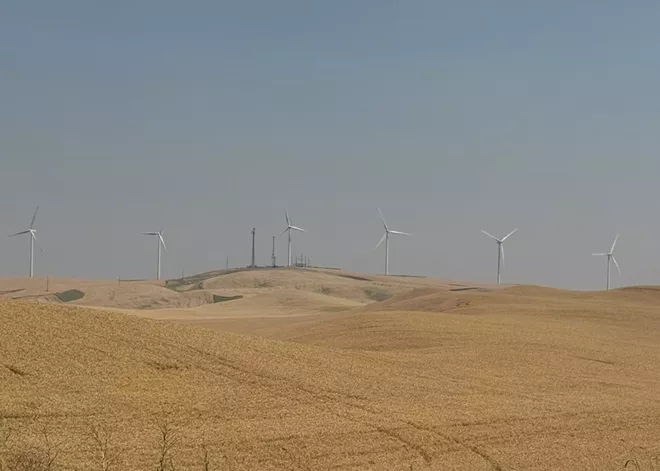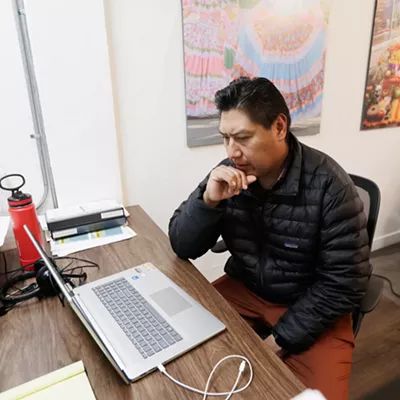
Spokane County's commissioners are taking the first steps toward allowing wind turbine farms in the county. A proposed zoning change would enable commercial wind energy facilities to obtain conditional use permits in the county's small and large tract agricultural zones.
Renewable energy siting is a hot debate in Washington, with solar and wind energy sites often proposed in rural or agricultural locations like the rolling hills of the Palouse in Whitman County, where the proposed Harvest Hills wind farm has been met with pushback.
This month, Spokane County Planning Director Scott Chesney told county decisionmakers about the need to incorporate zoning rules for wind projects into the county code.
"We have been approached by several energy companies who are interested in doing business in Spokane County," Chesney told the seven-member Spokane County Planning Commission on Aug. 15. "We have been informed by landowners that they are signing preliminary agreements ... if something goes forward, they're committing their land."
Chesney says Spokane County staff are working on the 10-year update of the county's comprehensive plan for 2026, but potential wind regulations weren't on their radar until recently.
"It was only as energy companies first came in and asked to meet and say we're interested in your county," Chesney says. "That led to some early research that we presented to the commissioners in May."
Chesney says that after that initial conversation with the Board of County Commissioners, his team started evaluating the best available science and looking at rules around the state and country.
Chesney presented draft zoning changes at the board's 9 am briefing meeting on Aug. 20. The proposal was then the subject of lively discussion at the commissioners' legislative meeting that afternoon, when concerns were raised over impacts on constituents, transparency of the rulemaking process and potential pathways to allow wind farms.
County Commissioner Chris Jordan said that getting briefed about the draft zoning amendment and being asked to direct staff to start creating the new code on the same day felt rushed. He was also concerned the proposal was more restrictive than neighboring counties' rules, and he wanted a more robust discussion about why it was drafted that way.
"I'm not satisfied with the process that's brought us to today's vote," Jordan said at the legislative meeting. "I don't believe that we have followed our best practices for an open and transparent process."
Jordan also said that any rushed wind regulations the county passes can be bypassed by the state's Energy Facility Site Evaluation Council (EFSEC).
County Commissioner Josh Kerns noted that the information was posted two weeks before Chesney briefed the Planning Commission on Aug. 15. Kerns also addressed the state's authority.
"When I was chair, I would have to initial and sign for no on the location of pot shops in our community that didn't meet our local zoning," Kerns said at the meeting. "I've yet to have a single person in this community come up and say, 'Well, we should do away with all of our local zoning as far as pot shops because the state can just come in and preempt it anyway.'"
The board voted 3-1 (Commissioner Amber Waldref absent, Jordan opposed) to direct the Planning Commission and staff to evaluate the proposal, starting with a public hearing on Thursday, Aug. 29, at 9 am.
Chesney says the draft changes were based on the "best practice" from neighboring counties, such as Whitman, which has renewable energy codes and wind turbines. However, Spokane County's proposal is more restrictive.
For example, Whitman County requires a setback of the turbine's height plus 100 feet away from any existing occupied buildings.
Spokane's proposed setback from occupied buildings is 1.5 times the height plus 100 feet, or 1,000 feet, whichever is larger. Additionally, Spokane would require a setback distance of 1.5 times the turbine height from the property line of nonparticipating landowners.
Renewable energy companies can work with county governments to develop codes that allow wind and solar energy projects. If a county's requirements are too restrictive, companies can pursue a pathway with the state's EFSEC, which can coordinate all evaluation and licensing steps for energy facilities in Washington.
Some of the rural areas that are drawing interest from renewable energy companies are in Spokane County's District 5, which is represented by Commissioner Al French, and District 4, represented by Commissioner Mary Kuney. Both districts would have sufficient wind to generate electricity and are largely agricultural, with potential locations in the southeast part of the county and west of Fairchild Air Force Base.
Jordan tells the Inlander that EFSEC can nullify local regulations and that the county should thoroughly analyze the language to ensure that the potential ordinance is not bypassed.
"We should take the time to get the input, talk to the stakeholders, look at the whole picture, not rush just to get restrictions on the books," Jordan says. "Because I feel that is a recipe for them to be ignored by the state."
French says he is interested in all energy sources and "freedom of choice," including hydrogen fuel cells, nuclear, wind and solar. He also says he is concerned about what state lawmakers might do.
"Olympia has been known to override the will of Eastern Washington," French says. "If the state chooses to override us, I can't control that, but I'm still not going to work and live in fear of what the state might or might not do."
When asked why Spokane County is just now creating rules for wind turbines, French says the interest wasn't there before. But because companies have now approached the county, it's time to go through a deliberative process, he says.
Jordan says his colleagues on the commission complained about wind turbine farms, but he wants more research on their positive effects on the economy and renewable energy sources as the board considers potential restrictions.
"There's been a lot of talk from my fellow commissioners about all of the negatives," Jordan says. "I just think we've so far failed to recognize the benefits that these projects may bring."
A final decision on the rules appears to be months away. Chesney says by email that no immediate action will take place after the Aug. 29 public hearing, and the county will continue to seek public comments.
"At this time, we expect to bring this to the commissioners by the end of the year," Chesney writes.
French says he is concerned about unintended consequences, and he wants a thorough review before decisions that will affect the community are made.
"I know there are zealots that say you've got to do renewable energy no matter what," French says. "We're not going to sacrifice our quality of life for somebody else's political agenda." ♦
























